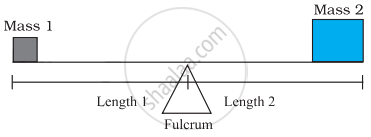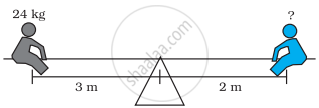Advertisements
Advertisements
प्रश्न
Unequal masses will not balance on a fulcrum if they are at equal distance from it; one side will go up and the other side will go down.
Unequal masses will balance when the following proportion is true:
`("mass"1)/("length"2) = ("mass"2)/("length"1)`

Two children can be balanced on a seesaw when
`("mass"1)/("length"2) = ("mass"2)/("length"1)`. The child on the left and child on the right are balanced. What is the mass of the child on the right?

उत्तर
It is given that, for balancing.
`("Mass" 1)/("Length" 2) = ("Mass" 2)/("Length" 1)`
According to the question,
Mass 1 = 24 kg, length 1 = 3 m and length 2 = 2 m
∴ `24/2 = ("Mass" 2)/3` ......[By cross-multiplication]
⇒ Mass 2 = `(24 xx 3)/2` = 36 kg
APPEARS IN
संबंधित प्रश्न
Find the third proportional to `2 2/3` and 4
Find two numbers such that the mean proportional between them is 14 and third proportional to them is 112.
Find the third proportion to the following :
`9/25` and `18/25`
Find the mean proportion of the following :
24 and 6
If `a/b = c/d = r/f`, prove that `((a^2b^2 + c^2d^2 + e^2f^2)/(ab^3 + cd^3 + ef^3))^(3/2) = sqrt((ace)/(bdf)`
If `a = (b + c)/(2), c = (a + b)/(2)` and b is mean proportional between a and c, prove that `(1)/a + (1)/c = (1)/b`.
If 2, 6, p, 54 and q are in continued proportion, find the values of p and q.
Determine if the following ratios form a proportion. Also, write the middle terms and extreme terms where the ratios form a proportion.
200 mL : 2.5 litre and ₹ 4 : ₹ 50
Are the following statements true?
45 km : 60 km = 12 hours : 15 hours
If x : y = y : z, then x2 : y2 is ______.
